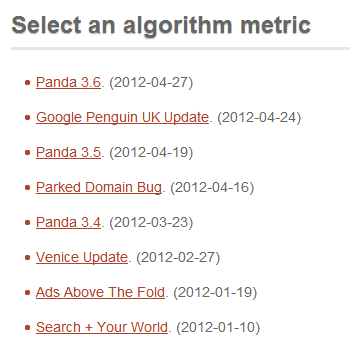April was a busy month for SEO’s as Google continued with its relentless pace of change in 2012 with the release of the ‘Penguin’ who has terrorised many sites over the last month.

This has been on the cards for a while, especially after well-publicised de-indexing of blog Link networks, such as buildmyrank. It has been expected for a long time that sites will be penalised by Google more harshly if they do not comply with their famous webmaster guidelines, especially after many seemed to be getting away with it.
Affiliate Niche Sites with Exact Match Domains at Risk?
I have spoken to some digital marketers over the last few weeks that have niche affiliate sites that have had issues. They had problems where their site had an exact match domain matched to the target keyword. When I analysed the link profile, they had a high amount of exact match anchor text links pointing to domain. You cannot honestly call ‘brown wedge shoes’ a brand term, for example. They did have some authentic user interaction and social shares, but not enough to outweigh the spam signals caused by these links. It is now more difficult to get any success with affiliate mini-sites aimed at one product and keyword from now on. Many of these sites have a short lifespan anyway, as often demand tails off as the product reaches the end of its lifecycle. Even some sites that were helped by Panda were hurt by Penguin.
The graph below shows a case where traffic for the exact match term for the domain has actually increased over the last few months. This could be a combination of a cleaner link profile or better content system than competitors in this area.

The Rise of Negative SEO
There has been an increased buzz around negative SEO this year, but even more so in the last month. Rand Fishkin offered a negative SEO challenge on his own personal site and also Dan Thies was targeted, after Matt Cutts responded to his twitter message about link networks.
The algorithm is not perfect and I am sure Google will continue to tweak Penguin over the coming year (much as they have done with Panda), but as mentioned in SEObook’s excellent post, it’s probably wise not to annoy too many people!
Future-Proofing – Can You Become Immune?
Even for small businesses it is possible to make your brand stand out and make it stronger. It can be frustrating, especially in the early stages of building a brand. It can take some time to fight against overly spammy competitors, who do not provide any benefit to users – their only reason for existing to make a quick buck by selling links on their site to related businesses. These Google changes are a step in the right direction and will benefit those are prepared to go the distance and believe in their brand and business.
Many of the larger, well-known brands I work with have seen a benefit from the latest changes, possibly as they are not so overly-optimised, and are established high street brands. If all of your link anchor text is ‘cheap fishing wire’ and your brand is ‘wirefish’, but that has no links, then that is an indicator that you will need to clean up your link profile. I still think it is possible with a great strategy for a small business to punch above their weight online.
Algorithmic Tracking
It is essential that major algorithmic changes are tracked, so that you can identify what affects this has had on your and your competitor’s site performance.
SEOMoz has a fantastic list of algorithm changes which stretches all the way back to 2000 (When the toolbar was launched). I have recently used this to monitor changes using a piece of SEO kit called ISOgen. With this you see any major movement in indexation, links and keyword visibility after an update.

Below is a comparison of three brands, where two seem to have benefited from the latest algorithm changes and one which has been penalised. The yellow bar shows keyword visibility, which has grown over 80% on 30 relevant keywords for two brands. Both of these companies will have benefitted from exposure from TV advertising campaigns and strong links as they are larger and more established. Would negative SEO hurt them? I very much doubt it, but it’s certainly possible. The third brand had a poor link profile and will need to clean this up as much as possible to recover.

The old methods that worked for many are no longer a sustainable business model. It is time to re-evaluate your online business, fix your technical issues, and develop a long term online strategy that will grow with your business.

Google is now great at releasing more information about changes, as I have mentioned in a previous post. For April, as well as Penguin, it seems there were many updates focusing on freshness quality, and making sure that low-quality fresh updates did not get through the net. It is now more important than ever to build your sites reputation, authority and trust in your niche with regular, high-quality content, utilising your brand’s core strengths.

